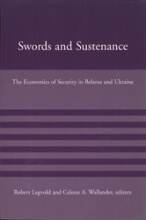Swords and Sustenance: The Economics of Security in Belarus and Ukraine

Other Publications in the Global Security series
Summary
The stability of the former Soviet states is threatened by their precarious geopolitical position within a turbulent economic and political environment. Swords and Sustenance explores the complex economic dimension of national security for two key post-Soviet countries, Belarus and Ukraine–that is, how they have dealt with the challenges posed by internal economic and political reform and their relationships with Russia and the West.
The book first examines how differing commitments to economic and political reform affect Belarusian and Ukrainian approaches to security. It then considers the central role of Russia, and how Russian interests and policies toward Belarus and Ukraine limit the two countries' foreign and domestic policy choices. Two chapters discuss the national security implications for Belarus and Ukraine of two key economic factors in their foreign policy: energy trade (in the form of oil, gas, and pipelines) and military-industrial cooperation (including the sale of arms). Finally, the book considers the relationships of Belarus and Ukraine with regional and global institutions and explores the policies of the EU, NATO, and the United States toward Belarus and Ukraine.
his volume is edited by Robert Legvold, professor of political science at Columbia University, and Celeste A. Wallander, senior fellow at the Center for Strategic and International Studies in Washington, D.C. Funding for Swords and Sustenance and other volumes in this series was provided by a generous grant from the Carnegie Corporation of New York.
Endorsements
"A thoughtful and penetrating analysis of the complex interdependence of security and economics in the post-Soviet space. It provides a valuable framework of analysis for both scholars of the region and policymakers."
- Zbigniew Brzezinski, Counselor, Center for Strategic and International Studies, former U.S. National Security Advisor
"Fixing a historical and contemporary eye on the cases of Ukraine and Belarus, this outstanding collection of essays represents the best of scholarship on the highly complex links between politics and economics–between national identity and interstate relations–in the post-Soviet space and its relations with the world at large."
- Roman Szporluck, Mykhail Hrushevs'ky Professor of Ukrainian History, Harvard University
"Swords and Sustenance serves as an important reminder that it is simply impossible to understand international relations without integrating political economy and security studies. This volume's contributions offer lessons for all IR students, regardless of specialization."
- Jonathan Kirshner, Associate Professor of Government, Cornell University
Table of Contents
Introduction
Economics and Security in the Post-Soviet Space
Celeste A. Wallander and Robert Legvold
Chapter 1
Security or Prosperity? Belarusian and Ukrainian Choices
Andrew Wilson and Clelia Rontoyanni
Chapter 2
Economics and Security in Russia's Foreign Policy and the Implications for Ukraine and Belarus
Celeste A. Wallander
Chapter 3
Interpreting Interdependence: National Security and the Energy Trade of Russia, Ukraine, and Belarus
Rawi Abdelal
Chapter 4
Military-Industrial Cooperation between Ukraine, Belarus and Russia: Possibilities, Priorities, Prospects
Hrihoriy Perepelitsa
Chapter 5
Economic Integration and Security in the Post-Soviet Space
Igor Burakovsky
Chapter 6
The United States, the European Union, NATO and the Economics of Ukrainian and Belarusian Security
Robert Legvold
Conclusion
Robert Legvold and Celeste A. Wallander
Index
Other Titles
The American Academy Studies in Global Security book series is edited by Carl Kaysen (MIT), Martin Malin (American Academy), and John Steinbruner (University of Maryland), and published by The MIT Press. This volume is one of five that consider international security in the post-Soviet region.